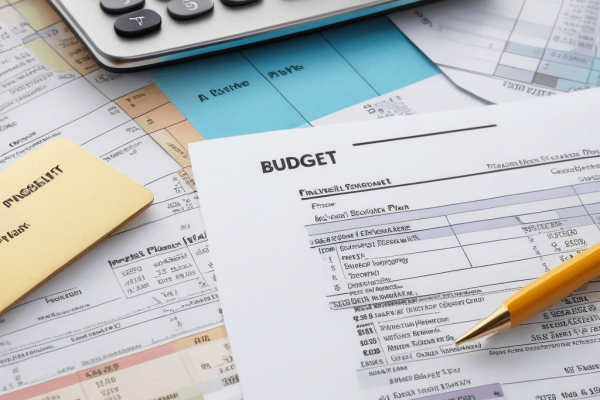Budget Planning is essential for achieving financial stability and success.
By understanding how to effectively manage your finances, you can create a roadmap that allows you to reach your goals.
This guide will delve into the basics of Budget Planning, helping you set realistic financial goals, track your expenses, and avoid common pitfalls.
Let’s explore how effective Budget Planning can transform your financial future.
Understanding Budget Planning Basics
Understanding Budget Planning basics is crucial for anyone looking to manage their finances effectively. At its core, Budget Planning involves analyzing your income and expenses to create a financial roadmap.
Start by identifying all sources of income, including your salary, freelance work, and any passive income streams.
Next, list your fixed expenses, such as rent or mortgage, utilities, and insurance payments. These are costs that do not change month to month. Don’t forget about variable expenses like groceries, entertainment, and dining out, which can fluctuate. Keeping track of these types of expenses helps you see where you can cut back.
Once you have a clear picture of your finances, set realistic and achievable financial goals. This could include saving for a vacation, paying off debt, or building an emergency fund. Utilizing budgeting tools and apps can make this process easier by providing a visual representation of your budget.
Remember, Budget Planning is not a one-time task but an ongoing process. Regularly review and adjust your budget to accommodate changes in income or expenses. This approach ensures you stay on track toward your financial goals and can help reduce financial stress.
Setting Financial Goals with Budget Planning
Setting financial goals is a key part of Budget Planning. It helps you focus your spending and saving. Start by determining what you want to achieve in the short, medium, and long term.
Short-term goals might include saving for a vacation or paying off credit card debt. These goals are typically achievable within a year. Medium-term goals could be saving for a new car or a home renovation, which you aim to accomplish in 1 to 5 years. Long-term goals often involve things like retirement savings or funding a child’s education, requiring more time to achieve.
Once you identify your goals, prioritize them based on importance and deadlines. Be sure to set SMART goals: Specific, Measurable, Achievable, Relevant, and Time-bound. This approach makes it easier to track progress and stay motivated.
Creating a budget that reflects these goals is crucial. Allocate a portion of your income towards each goal. Use budgeting tools or spreadsheets to monitor your spending and ensure you are on track.
Regularly review and adjust your goals as necessary. Life changes, and so might your ambitions. By staying flexible, you can adapt your Budget Planning to meet your evolving needs and stay focused on achieving your financial dreams.
Creating a Realistic Budget Plan
Creating a realistic Budget Plan is crucial for achieving your financial goals. Start by determining your total income, including salaries, side jobs, and any other sources of revenue. Once you have this basic figure, it’s important to categorize your expenses.
Begin with fixed expenses, such as rent, utilities, and insurance, which remain constant each month. Next, consider your variable expenses, which can change. This includes things like groceries, entertainment, and personal spending. Keep track of these expenses over a few months to see where your money goes.
After identifying your total income and expenses, make adjustments. Look for areas to cut back on unnecessary spending. Decide how much you want to allocate towards savings or debt repayment. This ensures your budget is not only realistic but also effective.
Use budgeting tools or apps to help you monitor your plan. They can provide valuable insights and reminders, helping you stick to your financial goals. Review your budget regularly to account for changes in income or expenses.
By following these steps, you create a plan that helps you live within your means while working towards your financial goals, making Budget Planning a manageable and motivating process.
Tracking Your Expenses for Budget Success
Tracking your expenses is an essential part of Budget Planning. It helps you understand where your money goes each month.
To start, keep a record of all your spending for at least a month. This can be done using apps, spreadsheets, or even a simple notebook.
Begin by categorizing your expenses into fixed and variable groups. Fixed expenses include rent, insurance, and subscriptions. Variable expenses could be groceries, entertainment, and clothing. By noting these categories, you can better see areas where you might overspend.
Regularly reviewing your expenses will help you identify trends in your spending habits. Are there areas where you consistently overspend? If so, consider modifying these habits. Set a budget allowing for necessary expenses while aiming to cut back on non-essential purchases.
Utilize budgeting tools or apps that track your expenses automatically. These tools can categorize your spending and provide insights. With this data, you’ll gain a clearer picture of your financial situation and can adjust your budget accordingly to ensure you’re working towards your financial goals.
Adjusting Your Budget as Needed
Adjusting your budget as needed is a crucial part of successful Budget Planning. Life is unpredictable, and financial circumstances can change quickly. Therefore, regularly reviewing your budget helps you stay aligned with your goals.
Start by checking your income and expenses each month. If you notice a significant change, such as a salary increase or unexpected expense, update your budget to reflect these changes. Always ensure that your budget reflects your current financial situation.Flexibility is key when adjusting your budget. If you find yourself overspending in certain categories, consider reallocating funds from other areas. For instance, if you’re spending too much on entertainment, you might want to reduce that category to allow more for savings.
Additionally, set aside some money for unexpected expenses. An emergency fund can help cover anything from medical bills to car repairs, minimizing the need to adjust your main budget dramatically. This proactive approach keeps you prepared for any financial surprises.
Tools and apps can also help in adjusting your budget more effectively. Use them to track spending, categorize expenses, and highlight areas where adjustments may be necessary. Frequent reviews will keep your budget relevant and ensure you meet your financial goals.
Common Budget Planning Mistakes to Avoid
Common budget planning mistakes can derail your financial goals if you are not careful. One major mistake is not tracking your expenses. Without knowing where your money goes, it’s easy to overspend in certain areas. Make sure to keep a detailed record of all your expenses, both fixed and variable.
Another common mistake is setting unrealistic goals. Goals should be SMART: Specific, Measurable, Achievable, Relevant, and Time-bound. If goals are too high, it can be discouraging if you are unable to meet them.
People also often forget to include irregular expenses. This includes annual subscriptions, car maintenance, or holiday gifts. Be sure to anticipate and plan for these costs to avoid budget shortfalls.
Many individuals fail to adjust their budgets over time. Life changes, and your budget should be adaptable to reflect changes in income or unexpected expenses. Regularly reviewing and adjusting your budget helps keep your finances on track.
Finally, avoid being too strict with your budget. Allow for some flexibility, as eliminating all fun purchases can lead to burnout. A good balance between saving and enjoying life is vital for long-term success.
Tools and Resources for Effective Budget Planning
Using the right tools and resources can enhance your Budget Planning efforts significantly. Start with a good budgeting app that can track your income and expenses. Popular options include Mint, YNAB (You Need a Budget), and EveryDollar. These apps help you create, manage, and adjust your budget easily.
In addition to apps, consider using spreadsheets like Microsoft Excel or Google Sheets for more personalized budget tracking. There are many templates available online that can guide you through setting up your budget step-by-step.
Books and online courses about personal finance can provide valuable insights as well. Look for resources from trusted financial advisors or websites, such as NerdWallet or Budgeting 101.
Don’t forget about local workshops or financial literacy programs. These can offer face-to-face guidance and support in managing your budget.
By utilizing these tools and resources, you can create a more effective budget plan that helps you achieve your financial goals.
In Conclusion
Effective Budget Planning is essential for financial success. By understanding the basics, setting realistic goals, and adjusting your strategies as needed, you can create a sustainable financial plan.
Regularly tracking your expenses and avoiding common pitfalls will set you on the right path. Utilizing the right tools and resources not only simplifies budgeting but also keeps you motivated.
Remember, a good budget allows for some flexibility; it should serve you, not restrict you. Embrace these practices, and you will cultivate healthy financial habits for a secure future.


